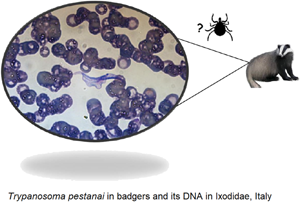Crossref Citations
This article has been cited by the following publications. This list is generated based on data provided by
Crossref.
Sanjuán, Carlos García
Aguirre, José I.
Villaverde, Silvia
Banda, Eva
Hernandez, Sonia M.
and
Yabsley, Michael J.
2022.
Surveillance for gastrointestinal, subcutaneous, and ectoparasites of invasive North American raccoons (Procyon lotor) in central Spain.
Veterinary Parasitology: Regional Studies and Reports,
Vol. 36,
Issue. ,
p.
100793.
Koual, Rachid
Buysse, Marie
Grillet, Justine
Binetruy, Florian
Ouass, Sofian
Sprong, Hein
Duhayon, Maxime
Boulanger, Nathalie
Jourdain, Frédéric
Alafaci, Aurélien
Verdon, Julien
Verheyden, Hélène
Rispe, Claude
Plantard, Olivier
and
Duron, Olivier
2023.
Phylogenetic evidence for a clade of tick-associated trypanosomes.
Parasites & Vectors,
Vol. 16,
Issue. 1,
Zazueta-Islas, Héctor M.
Salceda-Sánchez, Beatriz
Huerta-Jiménez, Herón
Miranda-Caballero, Carlos I.
Solis-Cortés, Marlene
de la Cruz-Pacheco, Yaretzi
Luquín-García, Ana Cristina
Mondragon-Peña, Laura V.
Reyes-Hernández, Jair
Bravo-Ramos, José L.
Sánchez-Otero, María-Guadalupe
Huerta-Peña, Javier C.
Hernández-Herrera, Rosa I.
San Martin-del Angel, Pablo
Roque, André Luiz Rodrigues
Rodríguez-Moreno, Ángel
Sánchez-Cordero, Víctor
Rodríguez Martínez, Héctor Abelardo
Grostieta, Estefania
Becker, Ingeborg
and
Sánchez-Montes, Sokani
2024.
Molecular Detection of Kinetoplastid Species in Ticks and Fleas Associated with Dogs and Humans in Mexico.
Pathogens,
Vol. 13,
Issue. 12,
p.
1072.
Juárez-Gabriel, Javier
Alegría-Sánchez, Daniela
Yáñez-Aguirre, Damaris
Grostieta, Estefania
Álvarez-Castillo, Lucía
Torres-Castro, Marco
Aréchiga-Ceballos, Nidia
Moo-Llanes, David A.
Alves, Fernanda Moreira
Pérez-Brígido, Carlos D.
Aguilar-Tipacamú, Gabriela
López González, Carlos A.
Becker, Ingeborg
Pech-Canché, Juan M.
Colunga-Salas, Pablo
and
Sánchez-Montes, Sokani
2024.
Unraveling the diversity of Trypanosoma species from Central Mexico: Molecular confirmation on the presence of Trypanosoma dionisii and novel Neobat linages.
Acta Tropica,
Vol. 251,
Issue. ,
p.
107113.
Lindhorst, Zoë Tess Lara
Brandstetter, Sebastian
Unterköfler, Maria Sophia
Eigner, Barbara
Spergser, Joachim
Colyn, Marc
Steinbach, Peter
Ćirović, Duško
Šprem, Nikica
Dumić, Tomislav
Veneziano, Vincenzo
Müller, Franz
Harl, Josef
Deak, Georgiana
Ionică, Angela Monica
Heddergott, Mike
and
Fuehrer, Hans-Peter
2024.
Molecular analysis of vector-borne pathogens in Eurasian badgers (Meles meles) from continental Europe.
Parasites & Vectors,
Vol. 17,
Issue. 1,
Kazim, Abdul Rahman
Low, Van Lun
Houssaini, Jamal
Tappe, Dennis
and
Heo, Chong Chin
2024.
Tick-associated Trypanosoma species (Apicomplexa: Kinetoplastida) from cattle ticks (Acari: Ixodidae) in Peninsular Malaysia.
Acta Tropica,
Vol. 259,
Issue. ,
p.
107383.
Gelli, Donatella
Gerardi, Gabriele
Lai, Olimpia
Stefani, Annalisa
Contiero, Barbara
and
Segato, Severino
2024.
HEMATOLOGY AND BIOCHEMISTRY REFERENCE INTERVALS FOR REHABILITATED EUROPEAN BADGERS (MELES MELES).
Journal of Zoo and Wildlife Medicine,
Vol. 54,
Issue. 4,
Sgroi, Giovanni
Manoj, Ranju Ravindran Santhakumar
Napoli, Ettore
D'Alessio, Nicola
Lucibelli, Maria Gabriella
de Martinis, Claudio
De Carlo, Esterina
Khademi, Peyman
Sazmand, Alireza
and
Veneziano, Vincenzo
2025.
Massive subcutaneous filariosis by Filaria martis in beech marten (Martes foina) in Italy.
Parasite Epidemiology and Control,
Vol. 28,
Issue. ,
p.
e00406.
Orłowska, Blanka
Świsłocka-Cutter, Magdalena
Filip-Hutsch, Katarzyna
Młocicki, Daniel
Olszewski, Adam
Asman, Marek
Anusz, Krzysztof
and
Werszko, Joanna
2025.
First detection and phylogenetic analysis of Trypanosoma species in European wolves and bears: discovery of novel haplotypes.
Scientific Reports,
Vol. 15,
Issue. 1,
Szekeres, Sándor
Nagy, Gábor
Csivincsik, Ágnes
Takács, Nóra
Kontschán, Jenő
Hornok, Sándor
and
Al Salihi, Karima
2025.
The European Badger (Meles meles) as a Host for Ticks and Tick‐Borne Pathogens in Peri‐Urban Environments, Hungary.
Transboundary and Emerging Diseases,
Vol. 2025,
Issue. 1,
